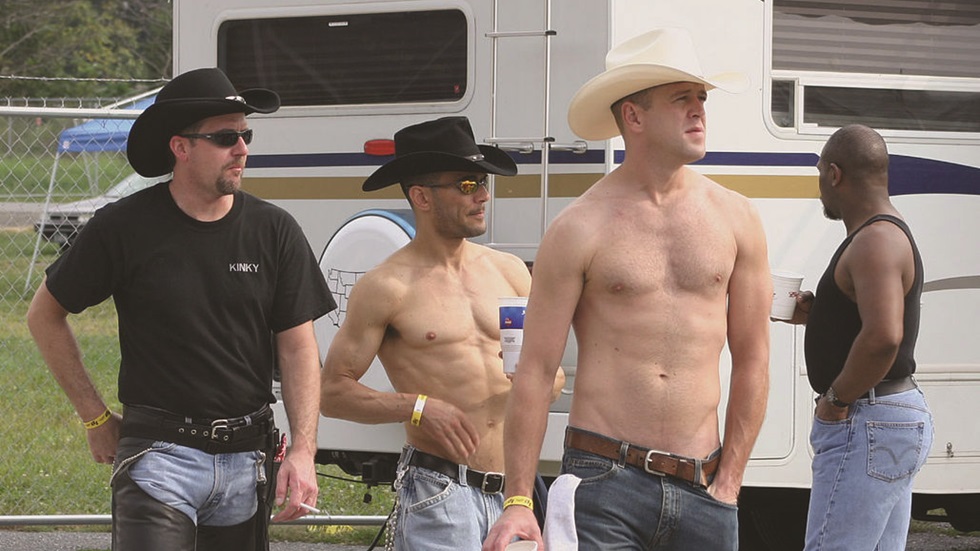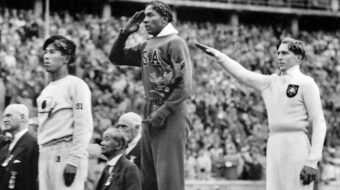
The love that dared not speak its name has been shouting from the rooftops for well over half-a-century now. There’s hardly a sphere of human endeavor untouched now by the queer presence among us, as employees and workers, as married couples, as consumers, as activists, voters, and holders of political office. In the days when the Western-attired Marlboro Man was still reigning as the very model of modern-day masculinity (before the model died of cancer)—and when the new bandanna, flannel, and leather masculinism came to signify the gay clone image—the first rustling of a queer sensibility in Western gear started taking hold.
Martin A. David’s new novel Pender Denton—Outlaw draws on this hyper-masculine trope, clothing his Old West tale in the many-colored garments we expect to find in contemporary fiction.

One of the first manifestations that I recall from these cultural stirrings took place in New York City in the early days of the AIDS crisis when, as a fundraiser, a group of producers packed Madison Square Garden to experience a whole Gay Rodeo, with all the trappings, a celebration of glorious testosterone in an era when gay men, however butch they might have been in their better days, were dropping by the dozens every day.
The runaway success of the 2005 film Brokeback Mountain, starring Jake Gyllenhaal and Heath Ledger, was based on Annie Proulx’s 1997 short story originally published in The New Yorker, which won a 1998 O. Henry Short Story Award and a National Magazine Award. Director Ang Lee’s work propelled same-gender love into the commercial mainstream and almost scandalously lost to Crash for Best Picture at the 78th Academy Awards. Brokeback did win Best Director, Best Adapted Screenplay, and Original Score.
In recent film news, in 2023, Pedro Almodóvar released a short, Strange Way of Life, in the Western genre, featuring a gay male couple. The trailer and further information can be seen here.
Nor is the world of country music a stranger to the new openness about sexuality. For a quick introduction to “28 LGBTQ+ Country Singers You Should Be Listening To,” see here. In the wake of Brokeback Mountain’s popularity, the iconic Willie Nelson startled the world with his 2006 cover of Ned Sublette’s song “Cowboys Are Frequently, Secretly Fond of Each Other,” which he re-recorded as a duet with Orville Peck in 2024. Then there is social media sensation Dixon Dallas, who won’t comment on his own orientation but releases one sexually-charged gay country tune after another lately.
But back to the book at hand. In his terse blurb, David summarizes his story: “Pender Denton, born in a bordello. His mother taught him to steal. Johnnie Sweetwater, a Shoshone tribal member, stolen from his village as a child and taken to a missionary school where he was robbed of his heritage. They lived together, loved each other, and robbed and killed together.”

David lives in Nevada and has a long history of studying the West and its ways. His familiarity with the terrain shines on every page. His power duo inevitably summon up memories of the Lone Ranger and Tonto, and like them, they too will ride off together into the sunset, as the book cover illustration so characteristically demonstrates.
Adventure leaps out from every page, as our horse-thievin’, bank robbin’ Robin Hood twosome fight off the bad guys. There’s enough social history here to show how “woke” (pace Ron De Santis) the story is. The far greater evils are committed by all those who occupied the Indigenous peoples’ lands and reduced their inhabitants to a kind of peonage. And those who exploited Chinese workers to build the railroads, those who made their fortunes in cattle while paying the cowboys dirt, those who wore the sheriff’s badge and took the law into their own hands, those who kept women in bondage to their beds, servicing men who outnumbered the opposite sex and had their needs to fill. The West David portrays is one where the gun rules and the social niceties don’t apply.
It’s a picaresque, rip-roarin’ tale that will hold the reader’s attention as we root for our flawed but basically decent heroes to find a place they can eventually call their own. Johnnie’s sharp shootin’ at the end saves the day.
If the novel closely follows the precepts of the genre, the author does bend the arc to a degree. Along with the “mixed-race” couple, we meet Amsoolah, an African ex-slave they travel with for a while, a colony of saintly Christian believers, a town of Eastern European Yiddish-speaking Jews (their Yiddish could use a little fixin’), a community of Chinese and Irish workers who’ve been stiffed by their contractor, some of the women in the bordellos, saloons, and flophouses that populated every community of any size. David is sensitive to the deracination of many of the Indigenous people we meet, including Johnnie, whom the missionaries nearly succeeded in washing the Indian out of.
In the heavily male-dominated West David depicts, we regrettably meet few women with strong contributions to the plot. The author tips his hat to nonbinary thinking, however, when Pender names each of his successive horses Bella—irrespective of gender—after his mother Annabella.
The writing is often lyrical and most certainly descriptive of the terrain and the folk we encounter. Here’s how he describes the night Pender and Johnnie seal their friendship:
The two men built a small campfire and a chicken that had wandered too close to the fence in a farmer’s yard roasted on the coals. The crisp fragrance of woodsmoke combined with the appetite-provoking aroma of the chicken swirled around them. The chilling breeze made them pull their bedroll blankets over their shoulders and huddle together close to the glowing coals. They ate quietly. Then, after a long silence, Johnny spoke.
“We are a good team. We give each other warmth and courage. We have more to offer each other if we are willing to accept it.”
“What do you mean?”
“When I was at the missionary school, there was a priest who singled me out. From him I learned that it was not only women who could satisfy a man. He showed me that men could also meet each other’s needs.”
Pender had heard of such things while growing up in Peggy’s Palace.
The older children spoke of a man who had lived there previously and who had been “that way.” Pender had never seen or experienced such explorations, but he had thought of it and wondered what it would be like.
The fire faded, and the woods grew still. The two outlaws huddled closer and then embraced under two bedrolls joined as one.
The reader will note, what shall I say? a certain prudishness, chasteness, perhaps? Or simply a sweet discretion. It might be worth contemplating for a moment David’s intended audience. I would guess this book is aimed at a young adult audience, those who seek adventure, a rousing, almost moralistic tale, and a happy ending with only the most discreet suggestion of a physical relationship.
One problem that leaps out at a reader is the frequent variation in the spelling of Johnnie’s name: Even sometimes on the very same page it’s rendered as “Johnny.” This should have been a five-minute fix with Find & Replace throughout the document.
In another instance, I was confused and wondered if the author even noticed: On pp. 21-22 David describes an encounter Pender has with Einar Johnson, the son of a man Pender killed in self-defense years before, in which Pender handily bests, but spares the son who has come to vindicate his dad. On p. 138, we meet an Einar Johnson again, but the two men seem not to recognize one another, and no mention is made of Pender’s earlier threat that he would kill him “if’n I ever see you again.”
One can excuse the almost magical reappearance of certain figures throughout the book, including Pender’s own long-lost father, as the author’s literary flourishes. What I think the author misses, though, is any evidence of the consequences of this same-gender romance. Are they ever taunted or attacked as perverts? Does anyone even notice they seem to be a couple? Wouldn’t they ever find others they could confide in along the way, or others of their own kind? Perhaps be betrayed. Were there other men (or women) one or the other might have been attracted to? In other words, apart from being gay, what impact does that have on these characters living their lives?
Martin A. David
Pender Denton—Outlaw
Book Locker: Trenton, Ga.
2024, 175 pp.
Print ISBN: 978-1-958891-56-8
Ebook ISBN: 979-8-88531-636-1
Available through all online booksellers
or directly from the author at www.mardavbooks.com
A video introduction to the book can be seen here:
We hope you appreciated this article. At People’s World, we believe news and information should be free and accessible to all, but we need your help. Our journalism is free of corporate influence and paywalls because we are totally reader-supported. Only you, our readers and supporters, make this possible. If you enjoy reading People’s World and the stories we bring you, please support our work by donating or becoming a monthly sustainer today. Thank you!












Comments